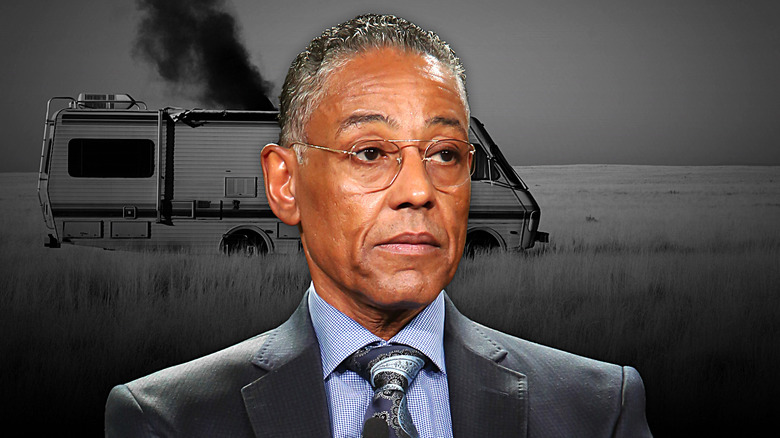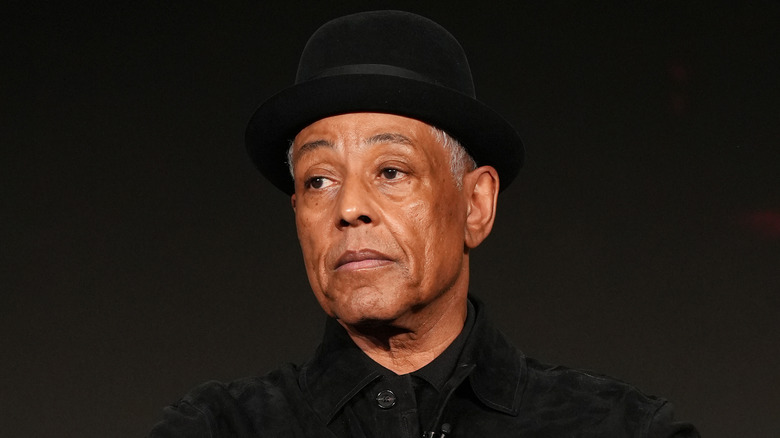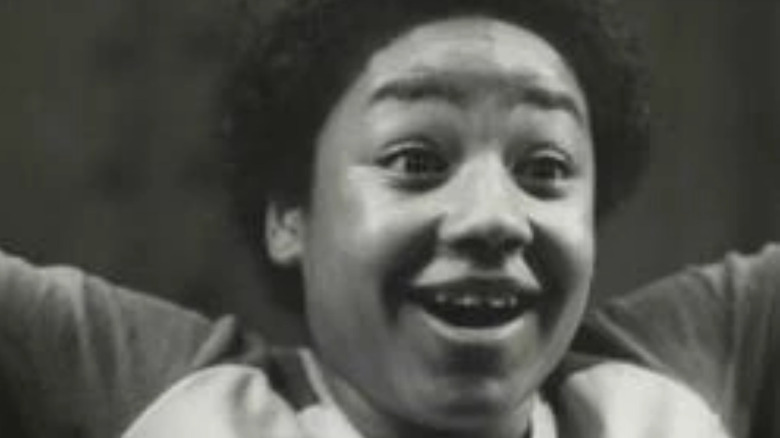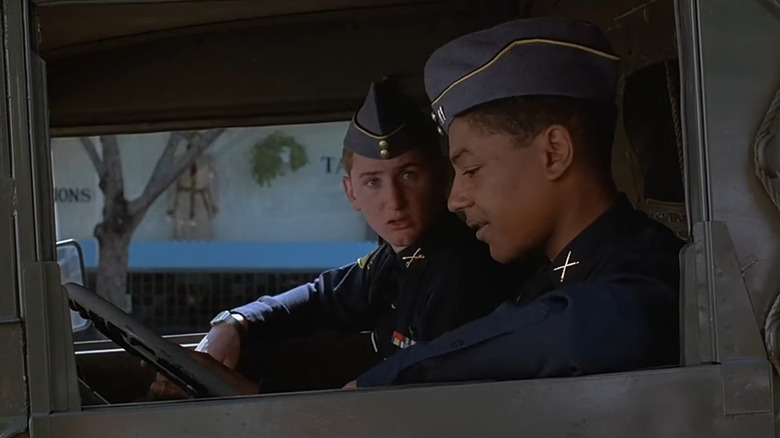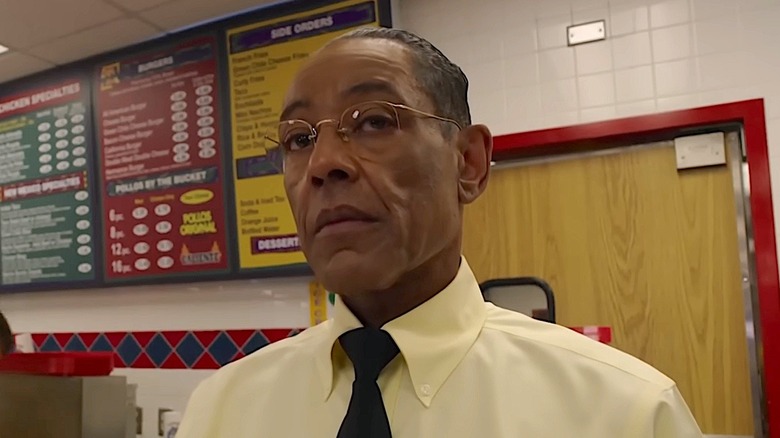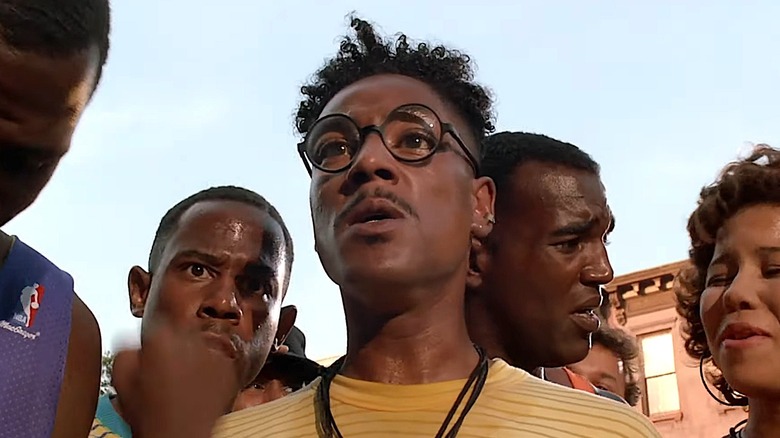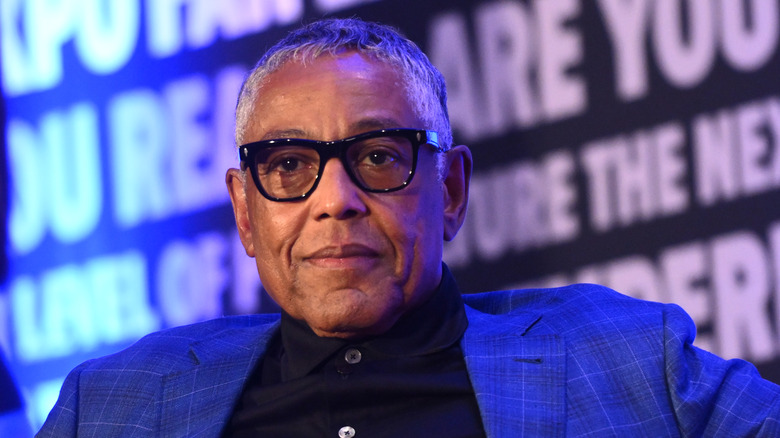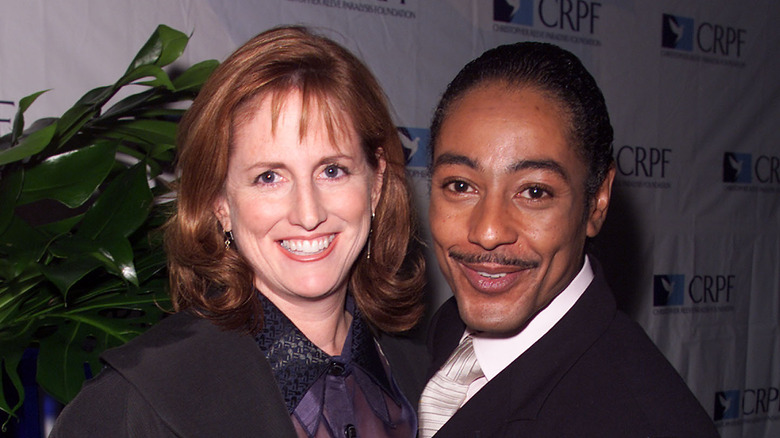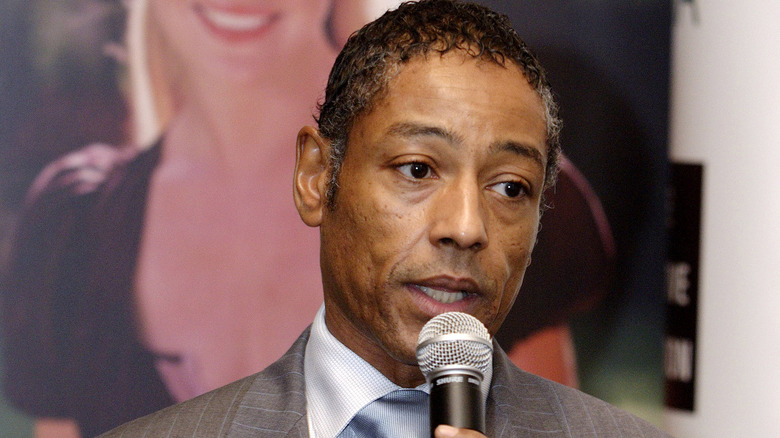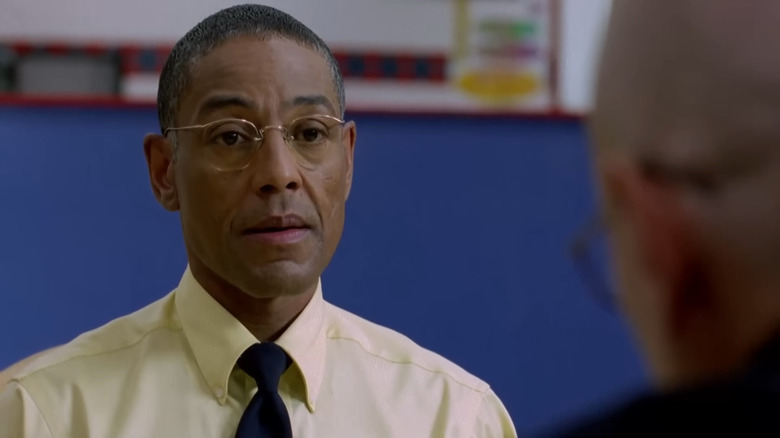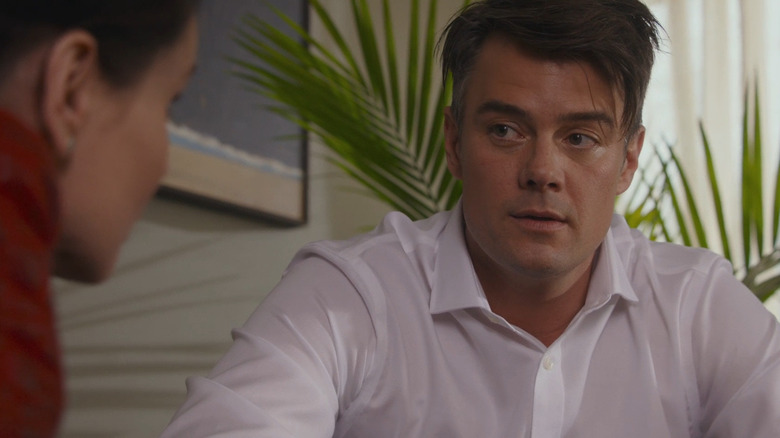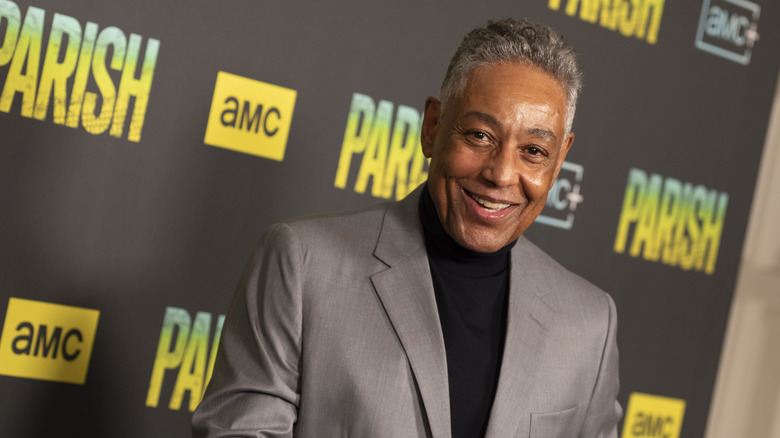Giancarlo Esposito's Tragic True Life Story
Giancarlo Esposito is famous the world over as a writer, director, and actor with a lengthy and varied career. However, he is perhaps best known for playing powerful villains at the top of their game. Whether it's the precise and perfectionist Gustavo Fring from "Breaking Bad" and "Better Call Saul," the ruthless and imposing Moff Gideon from "The Mandalorian," or the sinister and swaggering Stan Edgar from "The Boys," chances are you love his performance in something and recognize him from at least five other shows.
Esposito is a household name at this point, one seemingly synonymous with success — though this wasn't always the case. In a 2024 appearance on Jim Norton and Sam Roberts' podcast, the "Jim and Sam" show, Esposito discussed some of his darkest days. In 2008, he was going through bankruptcy and a divorce. He recounted considering hiring someone to kill him, so his family could collect on the insurance.
"I started scheming," he said on the show. "If I got somebody to knock me off, death by misadventure, [my kids] would get the insurance. I had four kids. I wanted them to have a life." While Esposito told this story with heartfelt humor, he was also serious about his dark days. Read on to learn more about Giancarlo Esposito's tragic true life story.
His young life was fraught with instability
Giancarlo Giuseppe Alessandro Esposito was born in Copenhagen, Denmark, in 1958 to an Italian father and an African American mother, who were also both involved in the performance world. Esposito's father was a stagehand, and his mother was a singer and dancer. Esposito said on the podcast "WTF with Marc Maron" that his mother was touring with legendary Josephine Baker when she was pregnant with Esposito.
While the life of an entertainer is certainly fun, it also carries endless job insecurity and instability. When Esposito was 5, his family moved to New York. There, Esposito told Marc Maron, his parents eventually split up, at least in part due to his father's womanizing. Esposito and his brother moved around with his mother, who dealt with her pain with alcohol, later learning to become a minister as, Esposito says, "to save her from alcoholism." While Esposito clearly has love for his parents, he sounds wary when describing the lack of stability he and his brother had in those days. It was a stability he found elsewhere.
"My discipline in my life came from understanding that if I was disciplined, I would be able to do something more with my life," he explained. Esposito said he considered priesthood when he was in the military school — not tragic options unto themselves, but full of the kind of order and seclusion that would both serve Esposito and isolate him throughout the rest of his career. "I would get up every morning and I would put on my vestments before the priests got to the church," he told Vulture about his time as an altar boy.
If you or anyone you know needs help with addiction issues, help is available. Visit the Substance Abuse and Mental Health Services Administration website or contact SAMHSA's National Helpline at 1-800-662-HELP (4357).
He got a rocky but hopeful start on stage
Eight-year-old Giancarlo Esposito got his start on Broadway in a short-lived 1968 production of "Maggie Flynn." Esposito was in multiple Broadway musicals before he hit 16. He still has a fondness for his "song-and-dance man" days, as he calls them when he brings them up in interviews. The New York Public Library dug through its archives to celebrate his stage past in 2013 and cited that New York Times theater critic Clive Barnes said Esposito's singing voice was "big, round, and clean as a freshly scoured skillet."
However, Esposito wasn't always just working for the love of the skillet-sounding game. He told Maron, "My mother wasn't getting any support financially from my father. There was pressure to make money." Little Esposito auditioned for agents and stage plays. He told Vulture: "I grew up not in poverty, but pretty, pretty close to it, and it's stuck with me my whole life."
In a 2023 New Yorker interview, Esposito recalled his turbulent early theater career and how it influenced his life going forward. Hearing Esposito tell it, it sounds as though he feels he missed some of his childhood. "Growing up too fast as a child on Broadway, as a performer who always had to be on, who always had to deliver — many of the things I missed, I haven't given back to myself yet," he explained.
Giancarlo Esposito struggled to get early roles and get into SAG
Giancarlo Esposito said he spent his teens and early twenties struggling to get into the Screen Actors Guild. "I never could afford to get into SAG," Esposito explained to Backstage. "I did all my extra work in movies, and after you do so many you have to join, and I remember being really poor and borrowing the money to get into the union."
He also said he struggled with translating the intensity that helps a performance read onstage into smaller arenas, like a movie's casting office. He has told his ultimate audition horror story in multiple interviews: his first audition for the 1981 thriller "Taps", about a group of students (including Tom Cruise, Sean Penn, and Timothy Hutton) who save their military boarding school from being taken over by real estate developers. The role of Cadet Capt. J.C. Pierce would be life-changing for Esposito — but at first, he didn't get it.
"[Casting director] Shirley Rich called me and she was really gentle. She said, 'Giancarlo, you're really good, but you just need to learn how to act,'" Esposito recalled to Backstage. He said Rich explained to the devastated Esposito that he needed to learn how to act more intimately — for the camera rather than for the stage. Esposito added, "Once I started doing plays, I got what she was talking about. But that was my worst nightmare, because I thought I was good then, and she was telling me, "You're good, but you're not good enough."
His complicated relationship with his family growing up continues to impact him today
After growing up with a complicated relationship with his parents, Giancarlo Esposito channeled it into creating some of the most memorable fictional villains ever to grace a screen. "My greatest fear is that I would become like my father. My greatest joy is that I'm exactly like my father. I loved him dearly, he's passed on. But my greatest fear is that I won't progress, I won't learn, and that I won't be as open as I am right now," Esposito explained to Mr Feelgood in 2023.
Esposito told The Associated Press in 2024 that he was bullied when he was young — by both his father and his brother. He said that he tries to make all of his characters feel personal by connecting their lives to his own somehow — and that for Gustavo Fring from "Breaking Bad" and "Better Call Saul," Esposito took inspiration from his own life to play the character, drawing on both military school and his experiences with bullying.
Esposito also wove this complicated relationship with his parents into his life as a parent and a performer. He told WAMU in 2024, "Every time I ... feel my dad, who was very Italian, very demonstrative, his way or the highway ... every time that comes up for me, I stop myself, take a deep breath and go, 'That's my father. That's Giovanni. That's not me.' I don't have to be him. I can be me. I can heal that space that he wasn't able to heal for himself, and it's the same with my mother."
He harbored youthful anger and resentment over his biracial identity
Giancarlo Esposito has widely discussed the bullying and teasing he dealt with as a mixed-race kid growing up in Rome, Cleveland, and New York City as a child and teenager. That prejudice and ingrained biracial shame followed him into his frequent collaborations with acclaimed filmmaker Spike Lee, where Esposito's relationship to his own identity remained a point of contention between the filmmakers and friends — which they sent up in 2024 for a Fiat commercial, of all things.
But for the role Lee cast Esposito in for "Do the Right Thing," Esposito tapped into the restless anger simmering under the surface of being unable to fully find acceptance with Blacks or Italians, always hovering somewhere in between. Esposito played Buggin Out in the film and had to engage in a violent screen showdown with (white) Italian-American, Danny Aiello.
"I'm half-Black and half-Italian, so I really related to the Italian lifestyle, and I had to go against that," Esposito recounted in a 2022 Vanity Fair interview about his career. "So when the camera rolled, we both went a little crazy in our verbal dialogue and things came out that were immediately conjured up from past experience. And the first thing we would do is go to each other and hug to release that take, let it go, because there was a lot of hate coming out from past generational traumas." Esposito's biracial identity in real life, as well as his ambiguous racial identity in his screen life, has been a tricky and inextricable element of his entire career.
Bad news bit parts got to him
While Giancarlo Esposito had major roles in early Spike Lee films, it took quite some time for him to gather steam as an actor — and in the meantime, he worked every odd job imaginable while auditioning for screen work. When he did start landing more roles, they were mostly bit parts as criminals. It was a living — but one Esposito didn't want to define him.
"I made my living on that little tinge of anger inside me, that allowed me to be an angry young Black man and rob some white lady onscreen," he told The New Yorker in 2024, adding: "I felt like doing that might be who I become forever, and I knew I had more to give." But it was a long time coming. So Esposito leaned into the racial ambiguity he could portray onscreen.
"When I was very young, I realized my hair would do anything. I could sweep it back, slick it down, and I could look Spanish," Esposito recalled to The Washington Post in 2020. "It was really survival." While this type of "survival" ultimately gave the world Gus Fring, it also added to the repressed biracial distress he was experiencing. Esposito said he wondered, "Is this me trying to escape my Blackness? Is it just me trying to fit in and be White because the White boys are working?" He continued, saying, "I had to get very clear with myself: No, this is me creating space."
He spiraled amidst divorce and financial downturn
Giancarlo Esposito's career took a turn for the better in 2002 after being cast in "Girls Club," a legal drama from David E. Kelley, the man then responsible for hit shows like "Chicago Hope," "The Practice," and "Ally McBeal." Esposito likely thought he was in for a hit. He and his then-wife, Joy McManigal, had four children, and Esposito bought a $1.5 million mansion in Connecticut. And then "Girls Club" was canceled — after only two episodes.
By 2008, the nation was in financial crisis — and so was Esposito. By his own admission on the "Jim and Sam Show," Esposito was overspending but unable to find much paying acting work himself. Esposito has traced this compulsion to keep up with the Joneses as another way he sought acceptance.
On Sam Fragoso's "Talk Easy" podcast in 2017, he talked about the bankruptcy he was facing, the depression, and what he thought was behind it, now that he had the benefit of time and distance, saying, "Divorced mother and father, always trying to people please to make people like me, to be good enough to walk through the door — without having given myself permission that I'm good enough just as I am to walk through the door." He also admitted that he had cheated on his wife early in their marriage and that the culmination of financial stress and relationship stress contributed to a time in his life so awful that he considered death by contract killer.
At his lowest, he considered death by misadventure
It might sound sensational that Giancarlo Esposito would have thought to have himself killed for insurance money, but for a time, Esposito said, it felt like his only way out. "It was a hard moment in time," he said on the show "Jim and Sam." "I literally thought of self-annihilation so they could survive. That's how low I was." Esposito ultimately didn't go through with those plans. "The pain I would cause them would be lifelong, and there'd be lifelong trauma that would just extend the generational trauma I'm trying to move away from," he said. "The light at the end of the tunnel was 'Breaking Bad.'"
Before the "Breaking Bad" turn came, Esposito said, he processed the bad choices he made first through suffering, then forgiveness. He told "Talk Easy": "I felt terrible ... the family moved away, I moved to the guest house, the bank took the house, I had to move out of the guest house, put my stuff in a barn, and moved on." He lived job to job until joining the hit AMC series. Later, Esposito revealed the house he and his family once shared was haunted, on an episode of "The Haunting Of..." — which could only add insult to injury. Presumably, ghosts are at least a quarter of the reason Esposito moved out to the guest house before he completely lost the property.
If you or someone you know is struggling or in crisis, help is available. Call or text 988 or chat 988lifeline.org.
Gus Fring was only a one-time guest spot at first
Landing the role of Gustavo "Gus" Fring in "Breaking Bad" in 2009 changed Giancarlo Esposito's life for the better — but it didn't seem like it was going to at first. While Esposito liked the script, his initial offer was for a guest spot role, he told "Talk Easy" — and the rate was $1,500. There was no guarantee the Los Pollos Hermanos fried chicken magnate would be in more episodes beyond that. While no one in the world is going to be mad at an extra $1,500 in their bank account, that kind of money is a drop in the bucket considering the financial situation Esposito found himself in. The heavy negotiation Esposito found himself in helped reactivate a sense of self that had been checked out during the depression, bankruptcy, heartbreak, and malaise he'd been experiencing those past few years.
Not only did the "Breaking Bad" role change Esposito's life creatively and financially, but it also may have relaxed some of his old isolating, priestlike tendencies. "In the first years of 'Breaking Bad,' I liked to do the method routine because it kept people away from me. No one wanted to come and say hello or chat about the weather. I'm not that chatty guy on set. I'm not the joker. ... Now after 12 years of playing the character, I can allow myself to be a bit looser," Esposito told the Independent. Long overdue, but also, a wee bit heartbreaking to hear. The character proved immensely popular among fans and critics, and Esposito even returned in "Better Call Saul."
The Show helped Giancarlo Esposito deal with his trauma
In 2017, with a career rejuvenated thanks to "Breaking Bad," Giancarlo Esposito directed "The Show," a film about a suicide-related reality TV show, starring Josh Duhamel. While the film wasn't well-received by most critics, it clearly marked an artistic turning point for Esposito as well as an opportunity to work through some trauma.
"My mother tried to commit suicide once, my uncle committed suicide, and I found myself at the wrong end of a 12-gauge shotgun at one point thinking that I should blow myself away," Esposito disclosed to The Daily Beast in 2017. "I only mention that because I do have some knowledge of depression and where that could lead to."
Esposito also acts in the film, as a kind janitor who looks to participate in the titular suicide show to help his family. Esposito told The Daily Beast, "Part of me was that guy. He's gotten to a place where he has to do something that he really doesn't want to do. But he's willing to make that sacrifice. I only know that feeling because I was there." While the film wasn't a hit, garnering a cold reception from critics and audiences, "The Show" demonstrates that Esposito was taking steps to confront the darkest parts of his life and channel it into his work.
If you or someone you know is struggling or in crisis, help is available. Call or text 988 or chat 988lifeline.org.
Giancarlo Esposito faces prejudice in his life and career
In 2012, Giancarlo Esposito shared several stories of hostile encounters with police. Esposito told the podcast "Bullseye with Jesse Thorn" that he'd been pulled over in a traffic stop by officers who approached his car with guns drawn. In a separate incident, he said, Esposito was profiled outside of a theater, forced by police to get on the ground. He said they told him they were after a suspect who had committed an assault nearby: a black man in a hoodie. Of course, Esposito was wearing a suit — which only clicked for the team surrounding him, guns drawn, after a good amount of screaming.
He said that the roles he got, too, reflected the way Hollywood saw actors of color. His entire career, he'd been profiled, given chances to act but usually not to play anything more than a stereotype. Only after "Breaking Bad" did this begin to change for Esposito, and his villainous role as Moff Gideon in "The Mandalorian" seemed to him like a turning point. Esposito told IndieWire, "I've strived in my career to be colorless. ... I am of mixed race ... and I grew through the period of time where I was relegated to playing thieves and thugs. ... So for me, it's a crowning moment when I could get a phone call from Jon Favreau, to say, 'I wrote a role for you.'"
